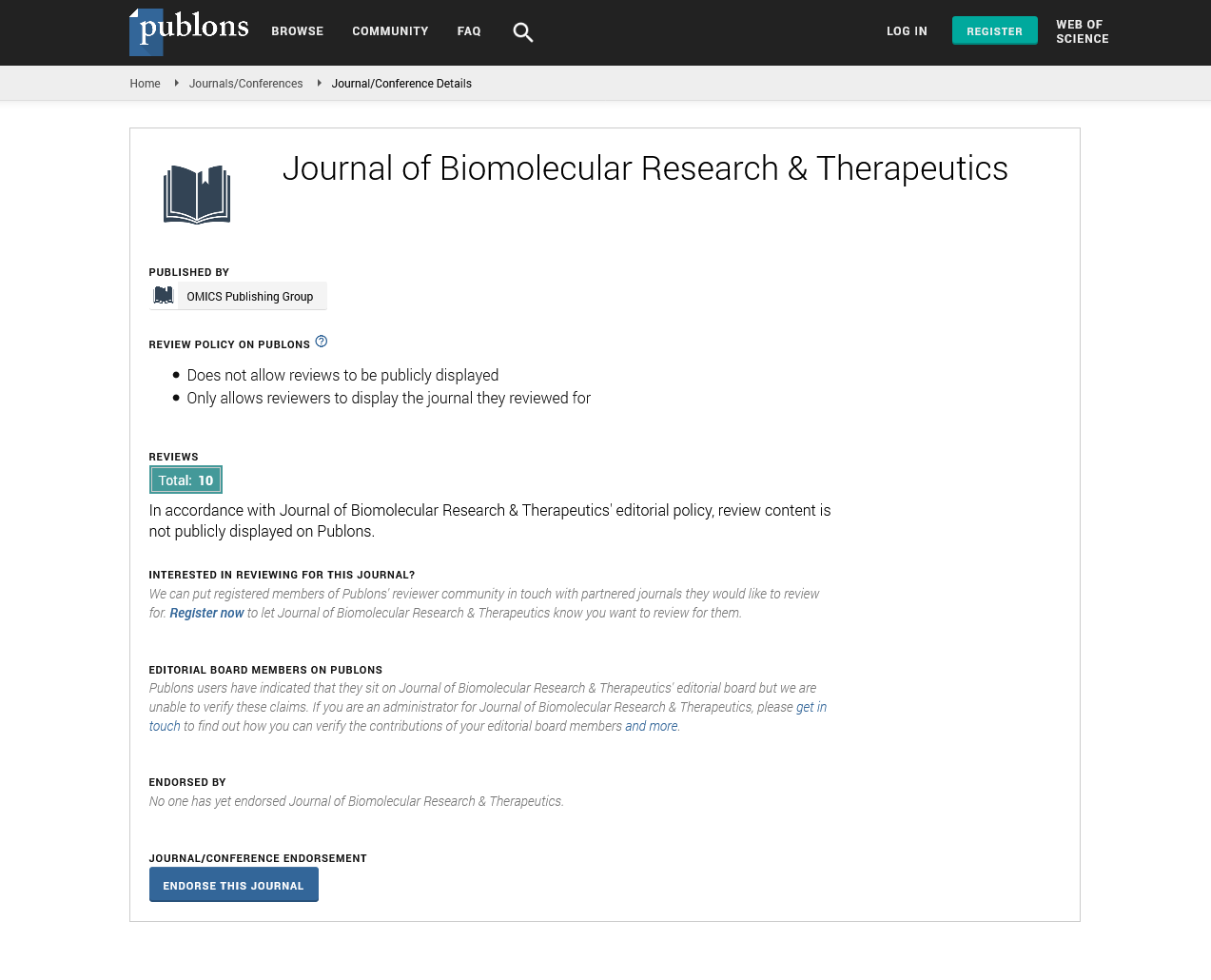Indexed In
- Open J Gate
- Genamics JournalSeek
- ResearchBible
- Electronic Journals Library
- RefSeek
- Hamdard University
- EBSCO A-Z
- OCLC- WorldCat
- SWB online catalog
- Virtual Library of Biology (vifabio)
- Publons
- Euro Pub
- Google Scholar
Useful Links
Share This Page
Journal Flyer

Open Access Journals
- Agri and Aquaculture
- Biochemistry
- Bioinformatics & Systems Biology
- Business & Management
- Chemistry
- Clinical Sciences
- Engineering
- Food & Nutrition
- General Science
- Genetics & Molecular Biology
- Immunology & Microbiology
- Medical Sciences
- Neuroscience & Psychology
- Nursing & Health Care
- Pharmaceutical Sciences
Commentary - (2023) Volume 12, Issue 12
A Comprehensive Exploration of Protein Therapies in Biomolecular Research
Kelly Wilcox*Received: 06-Nov-2023, Manuscript No. BOM-23-24338; Editor assigned: 08-Nov-2023, Pre QC No. BOM-23-24338(PQ); Reviewed: 30-Nov-2023, QC No. BOM-23-24338; Revised: 07-Dec-2023, Manuscript No. BOM-23-24338(R); Published: 14-Dec-2023, DOI: 10.35248/2167-7956.23.12.362
Description
Biomolecular research has undergone significant advancements in recent years, with protein therapies emerging as a prominent area of focus. Proteins play pivotal roles in various cellular functions, and harnessing their therapeutic potential has led to revolutionary developments in the treatment of numerous diseases. This article provides a comprehensive overview of protein therapies in Biomolecular research, exploring their applications, challenges, and future prospects.
Types of protein therapies
Monoclonal Antibodies (mAbs): Monoclonal antibodies have revolutionized the landscape of protein therapies. They are engineered to target specific antigens, making them effective in treating various diseases, including cancer, autoimmune disorders, and infectious diseases. Advancements in recombinant DNA technology have facilitated the production of therapeutic monoclonal antibodies with enhanced specificity and reduced immunogenicity.
Enzyme Replacement Therapies (ERT): ERT involves administering functional enzymes to individuals with enzyme deficiencies, such as lysosomal storage disorders. This approach has shown remarkable success in improving patient outcomes and quality of life. Ongoing research focuses on refining enzyme delivery methods and developing novel enzymes with improved pharmacokinetics.
Cytokine therapies: Cytokines are signaling proteins vital for immune responses. Therapies involving cytokines aim to modulate the immune system and combat diseases such as cancer and autoimmune disorders.
Peptide therapeutics: Short peptides have gained attention as therapeutic agents due to their high specificity and low toxicity. They are being explored for treating conditions like diabetes, cardiovascular diseases, and neurodegenerative disorders.
Advancements in peptide engineering and formulation are addressing challenges related to stability and bioavailability.
Applications of protein therapies
Monoclonal antibodies, immunotherapies, and targeted protein therapies have revolutionized cancer treatment. They deal precision in targeting cancer cells while minimizing damage to healthy tissues. Enzyme replacement therapies have proven effective in treating rare genetic disorders, providing faith for patients who previously had limited treatment options. Protein therapies, particularly monoclonal antibodies, are utilized to modulate the immune system and alleviate symptoms in autoimmune diseases like rheumatoid arthritis and inflammatory bowel disease.
Immunogenicity: Addressing immunogenicity remains a challenge, as the immune system may recognize therapeutic proteins as foreign, leading to neutralizing antibodies. Research is ongoing to mitigate these responses through protein engineering and innovative delivery methods. The high cost of protein therapies poses challenges to accessibility, especially in developing regions. Efforts are underway to explore cost-effective production methods and increase global availability. Advancements in biomolecular research are personalized protein therapies to individual patient profiles. Precision medicine approaches are being developed to enhance treatment efficacy and reduce side effects. CRISPR/Cas9 and other gene-editing technologies are opening new paths for protein therapies. Precise modification of genes encoding therapeutic proteins may lead to enhanced therapeutic outcomes and reduced off-target effects. Protein therapies have emerged as powerful tools in biomolecular research, present targeted and effective treatments across a spectrum of diseases. Ongoing research and technological advancements gives the faith of control current challenges, making protein therapies more accessible, personalized, and impactful in the years to come. As our understanding of biomolecular mechanisms continues to deepen, protein therapies are likely to play an increasingly integral role in the future of medicine.
Citation: Wilcox K (2023) A Comprehensive Exploration of Protein Therapies in Biomolecular Research. J Biol Res Ther. 12:362.
Copyright: © 2023 Wilcox K. This is an open access article distributed under the terms of the Creative Commons Attribution License, which permits unrestricted use, distribution, and reproduction in any medium, provided the original author and source are credited.

